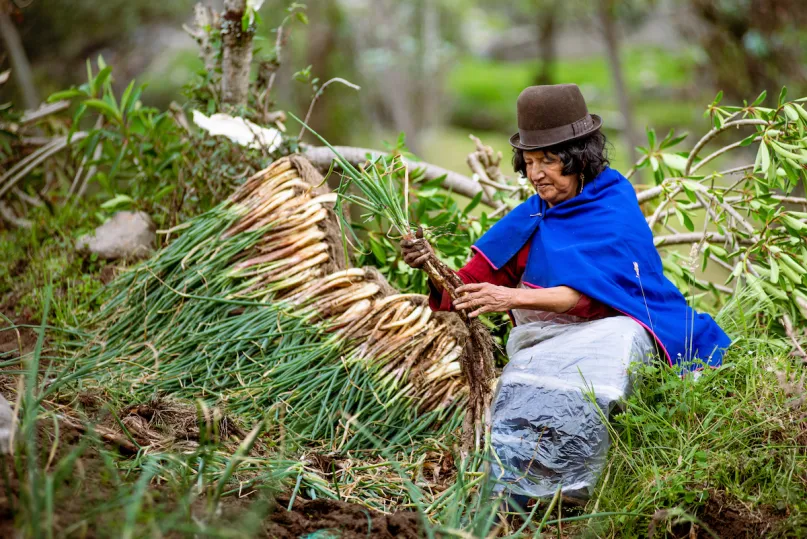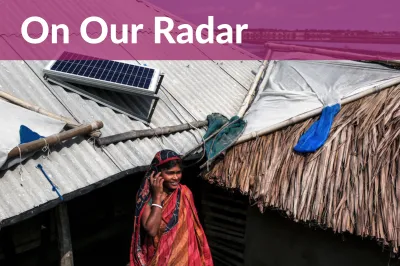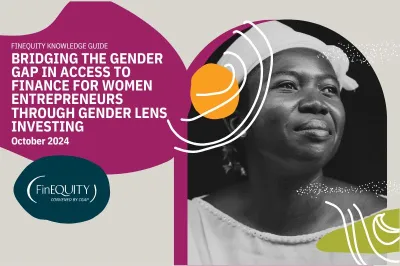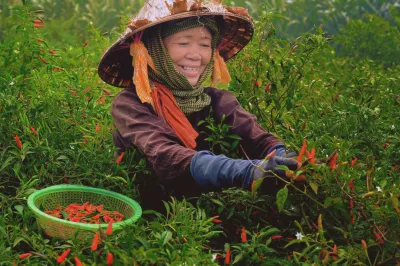Empowering Women to Face Climate Change: How Can We Create Awareness of Financial Products and Services That Meet Women’s Needs?

As climate events impact livelihoods across a range of geographies and communities, women are seeking out different financial products and services to help them adapt to their changing realities. During the FinEquity 2023 Annual Meeting, one of the member-led sessions centered around these financial inputs and the experiences of PULA in Zambia, Opportunity International in Ghana, and Fundación WWB Colombia.
Understanding women’s climate realities and financial needs
When we think about financial products and climate, there is often an immediate jump to credit or insurance. This may include credit to buy climate-resistant seeds and insurance to mitigate the impact of changing weather patterns on crops. However, climate impacts communities in very different ways, including through droughts, rains, erosion, pests, and disease. Women, in turn, have a variety of different needs depending on their realities. There is no single financial product or service that will meet the needs of all women. Furthermore, the gender gap in financial inclusion and financial literacy still exists and varies greatly from region to region. For example, almost 99% of Colombians living in the country’s major cities were financially included, while this drops to 69% in rural communities (SFC & Banca, 2022).
These compounding challenges further burden time poor women. There is an awareness gap as financial services do not automatically make sense to or resonate with those who use them as a tool to alleviate the impacts of climate change among women across Ghana, Zambia, and Colombia.
Experiences from Zambia, Colombia, and Ghana
To enable women to take advantage of financial tools that could bolster their economic lives in the face of climate change, Joyce Mlewa (PULA), Lydia Baffour Awuah (Opportunity International), and Ana Escobar (Fundación WWB Colombia) each detailed their approach to understanding their clients’ climate realities and financial needs. They also shared how they translated these findings into products and services, and, critically, access to appropriate non-financial services such as training and information that will support women to use them.
-
In Zambia, women farmers experience droughts, floods, pests, and diseases – an array of challenges which PULA is helping to manage the financial impacts of using weather-indexed insurance and area yield index insurance. To improve women’s awareness of these insurance products, PULA used a human-centered design (HCD) approach and deployed a ‘phygital’ method (including SMS, Interactive Voice Response, and in-person training). They also worked to increase women’s financial literacy, which was found to be lower among women crop farmers.
-
Experiencing both La Niña and El Niño, Colombia has the highest recurrence of extreme events in South America. With this in mind, Fundación WWB Colombia took a bottom-up approach to research how already marginalized women were managing these events. They found that indigenous communities in the west of Colombia were hesitant to engage in financial literacy around new products, highlighting that non-financial services and financial services must work together to design for these needs and close this gap.
-
Drought and intense and prolonged periods of sunshine have wreaked havoc on maize crops in Ghana. To build capacity around women’s savings, credit, and insurance products, Opportunity International paired these products with non-financial services such as weather alerts, market pricing, climate-smart agriculture, and financial literacy training to support their ongoing usage.
Understanding women’s realities and the specific climate shocks that they are experiencing is crucial in determining which financial products will empower them and improve their lives. However, as Opportunity International, Fundación WWB Colombia, and PULA demonstrated, this alone is not enough. Identifying and providing climate-affected women with the appropriate non-financial services to support their adoption and use of these products is an essential piece of the puzzle.
A recording of this session and its slides can be found here.


